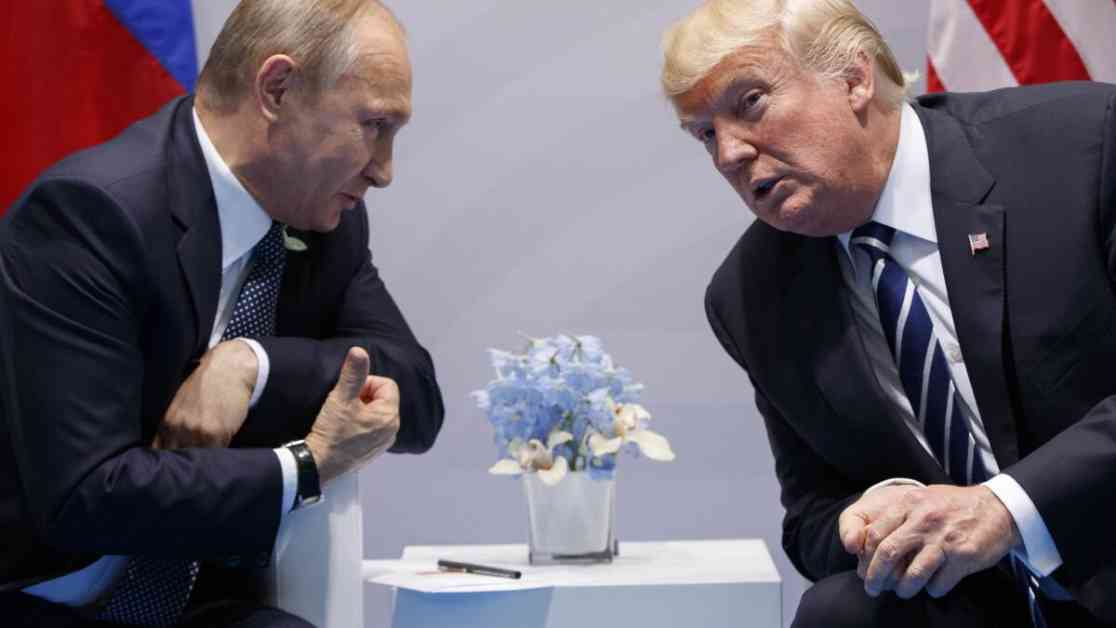Trump’s Tough Stance on Russia: A Critical Examination of His Presidency
Donald Trump’s ongoing discussions about his past presidential campaign activities continue to dominate headlines, particularly in relation to his stance on the construction of the Nord Stream 2 gas pipeline between Russia and Germany. The pipeline has been a point of contention for years, with bipartisan opposition citing concerns over Europe’s increased dependency on Russian energy. During his presidency, Trump took action by imposing sanctions on the company responsible for building the pipeline in December 2019, with the State Department emphasizing that the pipeline served as a tool for Russia to support its aggression against Ukraine.
U-Turn on Sanctions: Biden’s Decision and Trump’s Criticism
In 2021, President Biden made the decision to waive the sanctions imposed by Trump, a move that Trump has seized upon to criticize Vice President Kamala Harris. While Biden’s decision was partly aimed at repairing the strained relationship between the U.S. and Germany under Trump, it was also influenced by the fact that the pipeline was 90% complete when he took office. Despite Trump’s claims of halting the pipeline’s progress, the majority of the construction had actually occurred during his time in office. Furthermore, construction on the pipeline resumed in 2020 despite the 2019 sanctions, prompting Biden to reapply sanctions in 2022. The crucial question is not why Biden lifted the sanctions in 2021, but rather why Trump waited until the end of 2019 to take action.
The Mueller Report and Trump’s Russia Connections
To understand Trump’s delayed response to the Nord Stream 2 pipeline, one must delve into the findings of the Mueller report, which investigated interference in the 2016 election. The report revealed that in December 2013, the Trump Organization entered into a branding agreement for residential property in Moscow, which stood to net Trump nearly $20 million. However, following Russia’s invasion of Ukraine and annexation of Crimea in early 2014, the United States and its allies imposed economic sanctions on Russia, resulting in the collapse of Trump’s 2013 Moscow deal. The invasion further fueled criticism of the Obama administration’s foreign policy decisions, particularly targeting Secretary of State Hillary Clinton.
During the 2015 GOP primary debates, Trump’s responses regarding Russian aggression were telling. Despite his tough talk on Russia now, as a private citizen, Trump pursued business opportunities in Moscow even after the invasion of Ukraine. During a debate that year, Trump failed to condemn Putin’s actions in Ukraine, instead diverting the conversation to other foreign policy issues. It was later revealed that Trump had signed a letter of intent for a Moscow property deal on the same day as the debate. As his presidency unfolded, Trump’s hesitance to confront Putin on various matters, including election interference and military aggression, raised concerns about his approach to Russia.
Trump’s Handling of Putin and Ukraine
In July 2018, Trump’s controversial summit with Putin in Helsinki drew widespread criticism for his failure to address Russian interference in the 2016 election. Instead of challenging Putin, Trump questioned U.S. intelligence findings, further fueling speculation about his relationship with the Russian leader. Later that year, as Russia captured Ukrainian navy vessels and sailors, Trump’s delayed response to the incident raised alarm among world leaders. While other countries swiftly condemned Putin’s aggression, Trump’s tepid remarks highlighted his reluctance to confront Russia.
The ongoing conflict between Russia and Ukraine underscores the complex geopolitical dynamics at play. Russia’s control over key resources, such as wheat and sunflower seed oil, poses a significant threat to global food security. Should Ukraine fall under Putin’s influence, the repercussions could be far-reaching, impacting not only Europe but also regions dependent on Ukrainian agricultural exports. The potential weaponization of food security by Russia raises concerns about the broader implications of Putin’s aggressive tactics.
In conclusion, Trump’s rhetoric on Russia must be scrutinized in the context of his actions and decisions during his presidency. While he now portrays himself as tough on Putin, his track record reveals a pattern of hesitance and reluctance to challenge Russian aggression. The implications of his approach to Russia, particularly in the context of the Nord Stream 2 pipeline and broader geopolitical tensions, underscore the need for a comprehensive understanding of his foreign policy legacy.



























